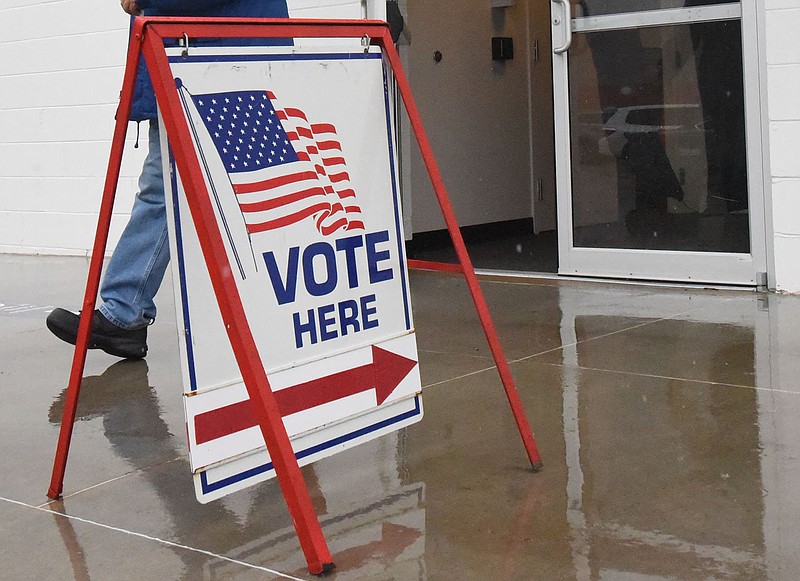FAYETTEVILLE -- Election officials from several Northwest Arkansas counties were urged Wednesday to contact their legislators in an effort to influence election-related bills being proposed or actively under consideration.
"There's a lot of bills being prepared right now," Renee Oelschlaeger, chairman of the Washington County Election Commission, told the group. "We need to be aware of how they affect our process."
Jennifer Price, Washington County's election director, prepared a list of election-related bills that have been drafted or introduced in the Legislature and another list of bills proposed by the state Board of Election Commissioners.
The bills touch on many areas of election law. Price pointed to several she has already questioned.
Senate Bill 216, sponsored by Sen. Clarke Tucker, D-Little Rock, requires voters be able to cast their ballots within one hour of arriving at a polling location on election day. If a voter is unable to do so, he can file a complaint with the state Board of Election Commissioners who would then have the authority to determine the polling sites for the next election in that county.
Jim Estes, a Washington County election commissioner, said the bill left many questions unanswered.
"When do you start counting for the 60 minutes?" Estes asked. "When do you end the counting?"
Price said the bill doesn't take into consideration many factors that could lead to wait times of more than one hour.
Price and others added that if a voter gets into the line at the polling place and then doesn't have the proper identification, that increases the time spent waiting in line for every voter. Others said simple equipment problems can also contribute to delays.
Voters are allowed to take 10 minutes to complete their ballots once they are checked in and given access to the voting machines, Price said. She added some voters aren't always familiar with all of the races or ballot issues in an election and spend time at the machines reading their ballots."If voters are taking the full 10 minutes, that just means the voter waiting in line is going to be waiting longer," Price said. "This is something that shouldn't be addressed legislatively."
Chris Carter, chairman of the Marion County Election Commission, said providing for a complaint to the state and giving the state Board of Election Commissioners power over future elections would be inviting problems.
"If people know they only have to stand in line for 60 minutes, you know that at 61 minutes there are some people who are going to be firing off a complaint," Carter said.
Another proposal deals with the use of paper ballots and hand counting ballots. The proposal would allow quorum courts to decide that their counties will use only paper ballots. The bill, Senate Bill 250, sponsored by Sen. Kim Hammer, R-Benton, does say any paper ballot must be able to be counted using the electronic voting equipment now in use in Arkansas. The bill also requires that election results be available within 24 hours.
Several commissioners and county clerks said hand-counting paper ballots is both costly and inefficient. Price said the proposal could mean hand-counting as many as 98,000 ballots in Washington County.
Others agreed they are not in favor of hand-counting ballots.
"In Pope County, we do not hand-count our ballots nor do we want to," Election Commissioner Freddie Harris said. "We trust our equipment."
Another proposal would extend the early voting period from two weeks to 30 days and make the voting days longer. Price said the way the bill, Senate Bill 230, sponsored by Bryan King, R-Green Forrest, is written makes it mandatory that county clerk's offices be open for the full 30-day period. That would mean additional poll workers working longer hours and increase the cost of every election, all agreed.
Price spent some time Wednesday explaining how election officials can read the bar codes found on the ballots used in the electronic voting machines. She said the bar codes provide information about the voting precinct and the races that should be on the ballot. She said county clerks typically have bar code scanners that can read the codes, and anyone can download an app onto their cellphones that will also read the bar codes.
Oelschlaeger said people have questioned the bar codes and claimed that they are somehow used to switch votes.
"We need to be prepared to answer to a voter what the bar codes mean and to be able to demonstrate that to a voter," Oelschlaeger said. "We need to show that our equipment is reliable, even though some people will never be convinced."
Carter suggested the secretary of state's office or the state Board of Election Commissioners should produce a short video demonstrating the use and the meaning of the bar codes so election officials will have that as a resource to educate voters.
Price said she will provide a regular update to the election officials by email as the Legislature continues working on these and other election-related proposals.
Sharon Hoover, chairwoman of the Carroll County Election Commission, said the update will be helpful to her.
"I think it's great," Hoover said. "We can see what bills are being considered and call our senators and representatives to let them know what we think about them."

